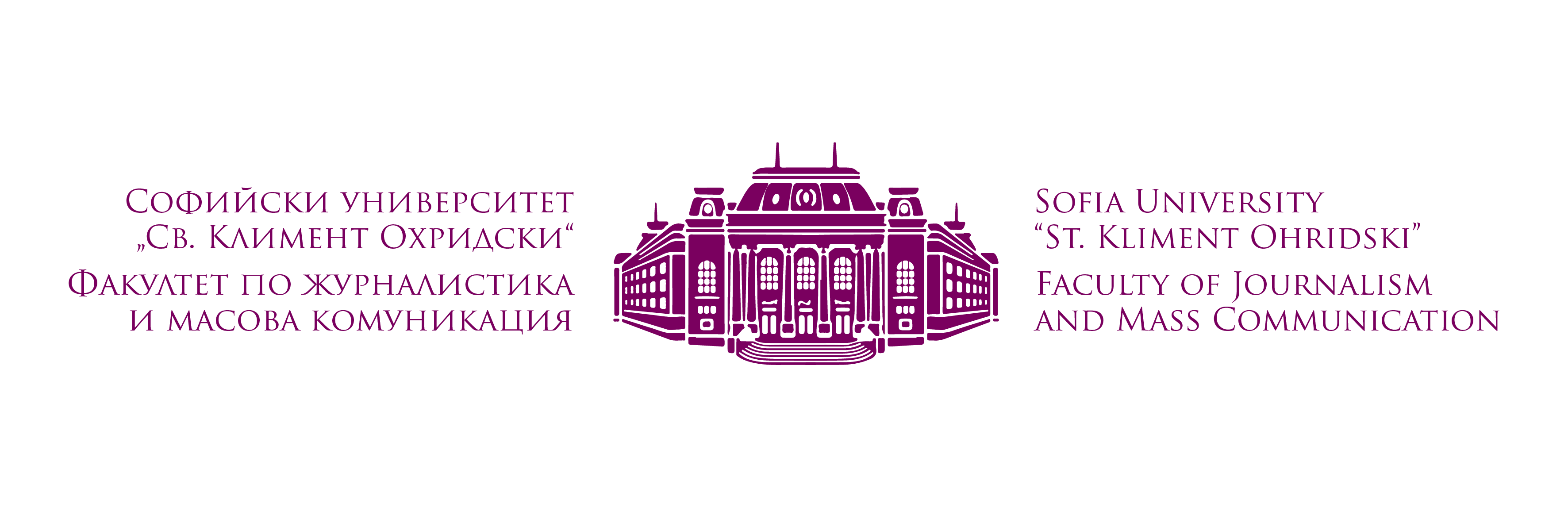Academic Celebration: President Radev Awards Badge of Honour to Sofia University’s Journalism Faculty on 70th Anniversary of the specialty Journalism
The Faculty of Journalism and Mass Communication celebrated the 70th anniversary of the specialty "Journalism" with an academic ceremony. At the celebration in the Aula, the President of the Republic of Bulgaria Rumen Radev awarded the Faculty of Journalism and Mass Communication with the Honorary Badge of the President of the Republic. During the ceremony, Prof. Milko Petrov, DSc, was awarded the Honorary Badge with a blue ribbon of Sofia University, and the graduates of the Faculty's Class of 2022 received their diplomas of higher education, the website of Sofia University reports.
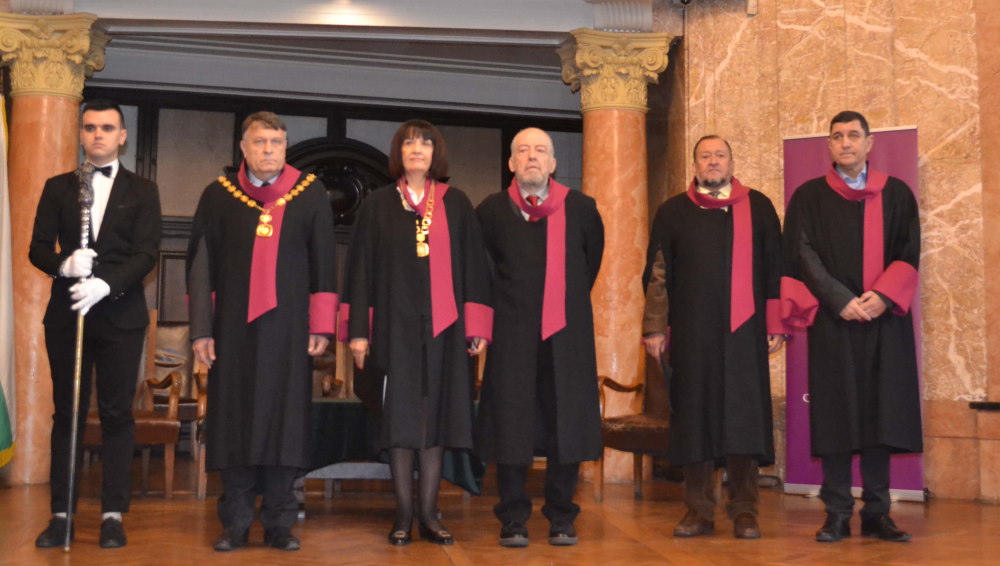
The academic celebration was also attended by the Vice Rector of Sofia University Assoc. Prof. Dr. Georgi Valchev, the Minister of Education and Science Prof. Sasho Penov, graduates of the specialty "Journalism", the general directors of the Bulgarian National Radio and the Bulgarian Telegraph Agency, lecturers, graduates and guests.
The academic celebration was opened by the Dean of the Faculty of Journalism and Mass Communication, Prof. Dr. Veselina Valkanova, who congratulated the attendees and said that it was a great honour for her as Dean to open the celebration dedicated to an anniversary significant for the whole community, in a broader perspective - for the culture, education and science in Bulgaria - the 70th anniversary of the founding of the Journalism specialty at Sofia University. "For the academic community, the anniversary is an occasion to look back with satisfaction at the achievements of the dozens of scholars and lecturers, of the thousands of graduates of the Faculty who, over the past seven decades, have contributed to the authority of Bulgarian academic education and held high the professional standards of journalism and the media," the Dean said, stressing that education and the defence of free speech are among the most important values of our modern society, to which we owe our daily, united efforts.
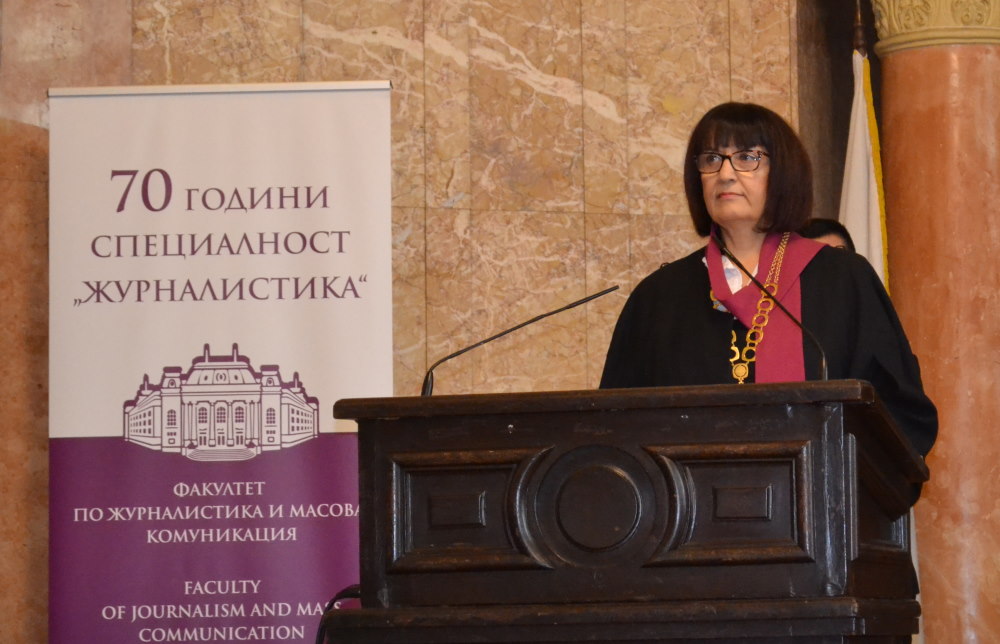
Prof. Prof. Valkanova noted in her speech that journalism is a responsible and complex, demanding profession, a strong institution, a high vocation, a moral choice. "The journalist is hired, fired, demoted, appointed, edited, lectured, reprimanded," Prof. Vancanova said. Valkanova and pointed out that after decades of ink-stained idealism, in unequal and daily resistance to the pressures of editors, publishers, advertisers, politicians, business, through the era of radio and television, to today's network of "merged" and sophisticated, convergent media in a complex and divided world - journalism remains with the vocation to serve society, to make the highest demands on politicians, on those who govern the world, that they serve, that they are accountable and that they are there to secure basic human rights. "And while there remains a diminishing share of journalism not as a business, but as journalism to the marrow of the bones, with a great deal of 'moral tension' in the words of William Lee Miller, journalism is that - public affairs, news, not entertainment or entertainment as a lure for news and especially a lure for advertisements," the Dean of the Faculty of Journalism and Mass Communication said.
Prof. Valkanova drew attention to the fact that the duties of the profession, public expectations, claims, the implicit moral tasks of journalism exceed those of other professions and despite all the prejudices, criticisms, despite all the despair that the mission of independent journalism is mission impossible, there are reporters and reports, there are news and news writers, there are commentators and commentators on whom journalism can be and is taught, who practice journalism of a high order. She added that if journalism gets the respect it deserves because of the ideal of a free and independent media, it must struggle every day to earn it in the daily struggle for truth, through free argument and debate, having a responsibility to itself and an intolerance for the moral compromises that people who accidentally fall into the profession make. Because good journalism is self-controlled, it is at once tolerant and sharp, constructive and courageous, patient and quick to fire, respectful of its audience.
In his speech prof. Valkanova recalled another key phrase of Orwell, that "in times of widespread lying, to tell the truth is extremism" and added that many follow the vocation of the journalist, do not compromise - personal, institutional.
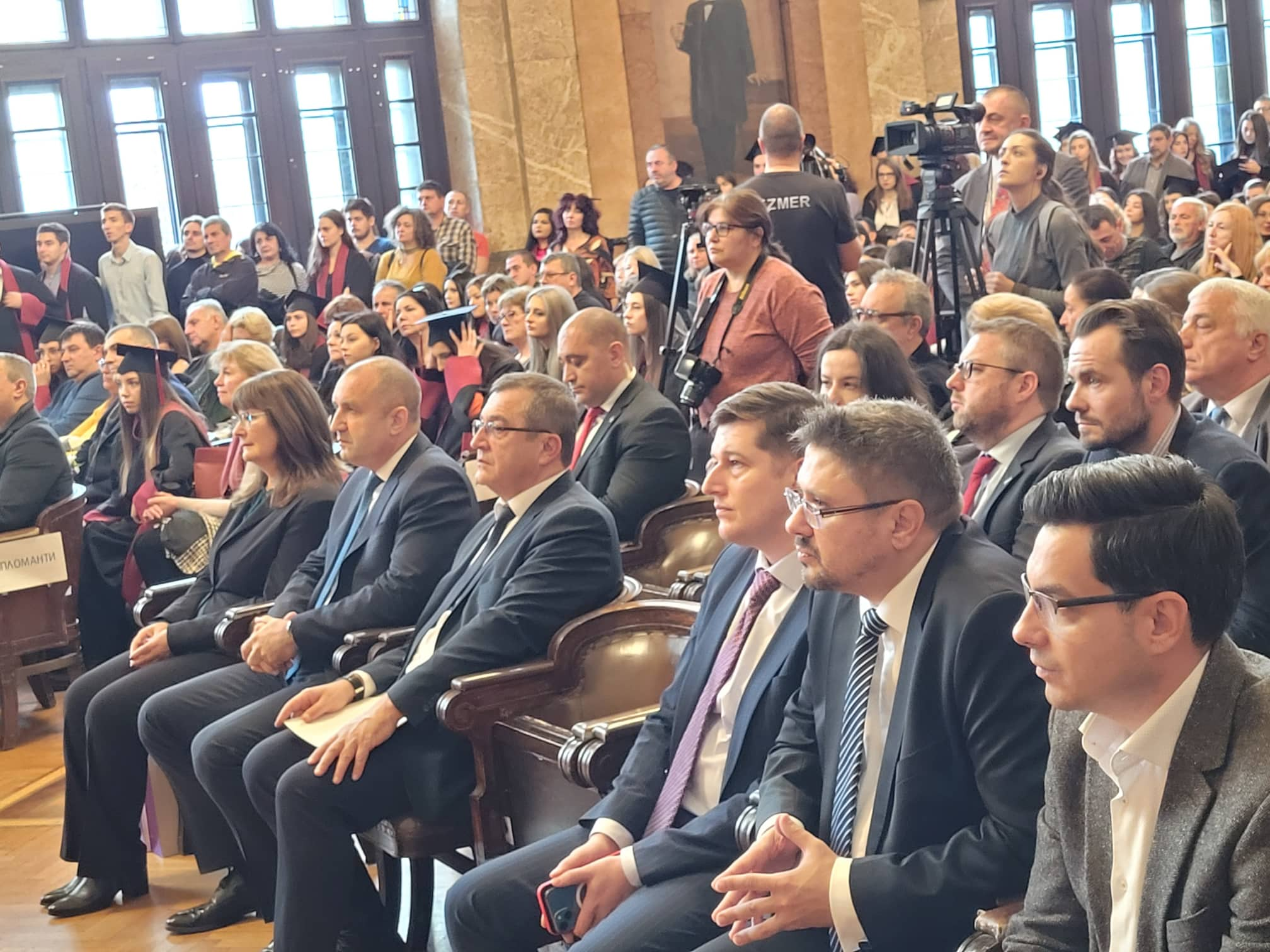
"When there is a community united by values, despite the competition, regardless of the situation, when there is a vocation, when there is a moral task, there is no crisis for journalism, there is no danger of de-professionalization, there are constitutive tasks, there are challenges, there are new roles, functions, missions", pointed out Prof. Valkanova.
In her address to the attendees in the hall, she stressed that journalism education is more important now than ever. "We have been teaching journalism for 70 years and we have a duty not only to the students, but also to the profession, to the environment, to the audience and to the establishment of high professional standards in journalism. We believe that we give our students the best of the world's scholarship and practices in media and communications, that we teach that knowledge that is worth learning and those lessons that need to be learned," the dean said.
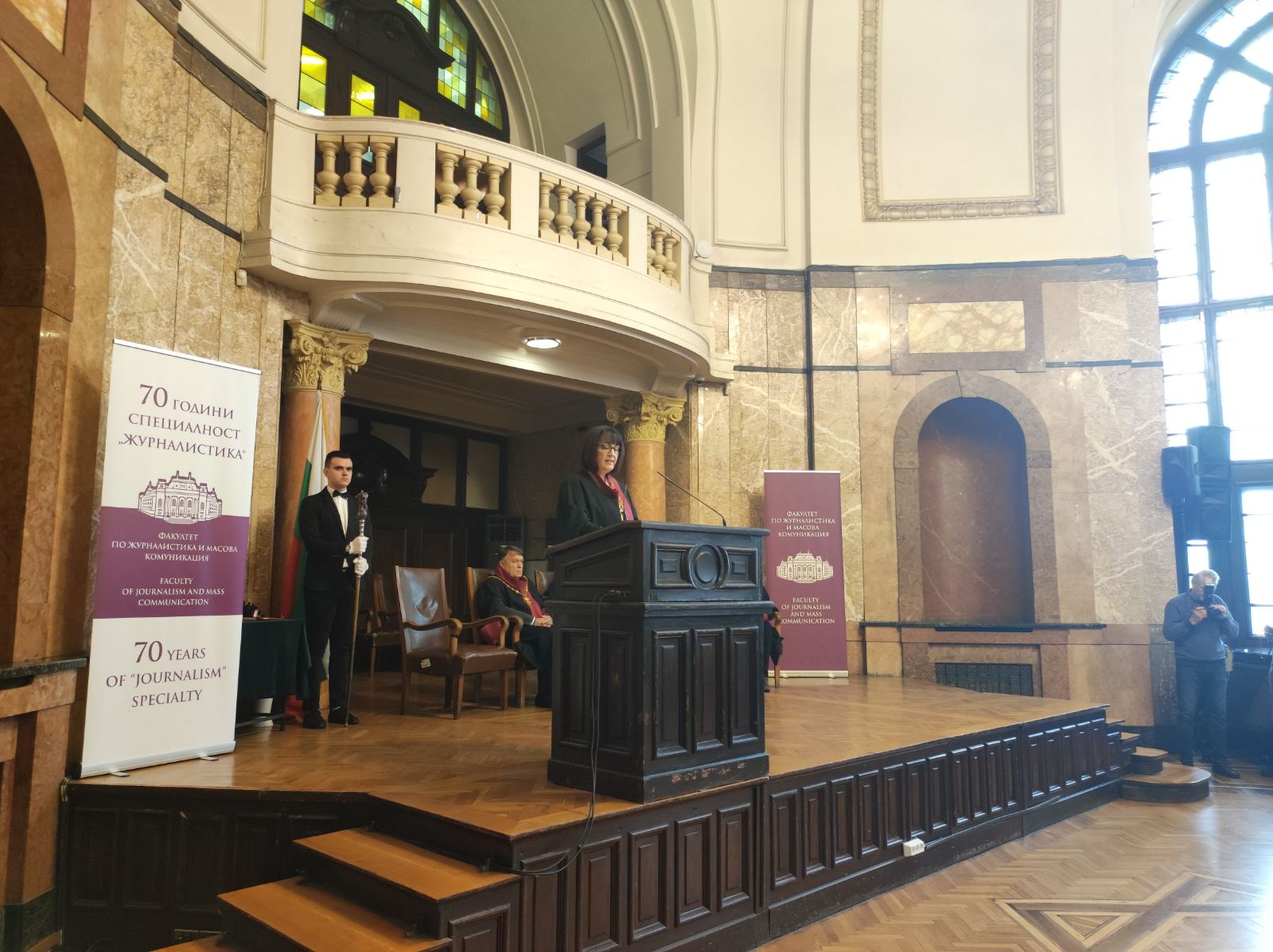
Finally prof. Prof. Valkanova thanked all the professors of journalism, who over the past seven decades have given energy to the specialty, have trained hundreds of students, PhD students, postdocs, graduate students and young scientists, with their research, scientific works and monographs have developed an important scientific field - communication science, the science of media and public communications.
She also thanked all the students for reaching out to the faculty and staff, from the first class of the academic year 1952/1953, to this year's class receiving their degrees today. "This day is for all of you, all of us! Happy celebration!" said Prof. Valkanova.
The Vice-Rector of the Sofia University "St. Prof. Dr. Georgi Valchev noted in his address that 70 years are both many and few, just like the years of Sofia University, which in 2023 turns 135 years old, but this is a good beginning and we are always trying to turn knowledge into strength. In his words, the journalistic profession is extremely challenging, accompanied by many difficulties in life.
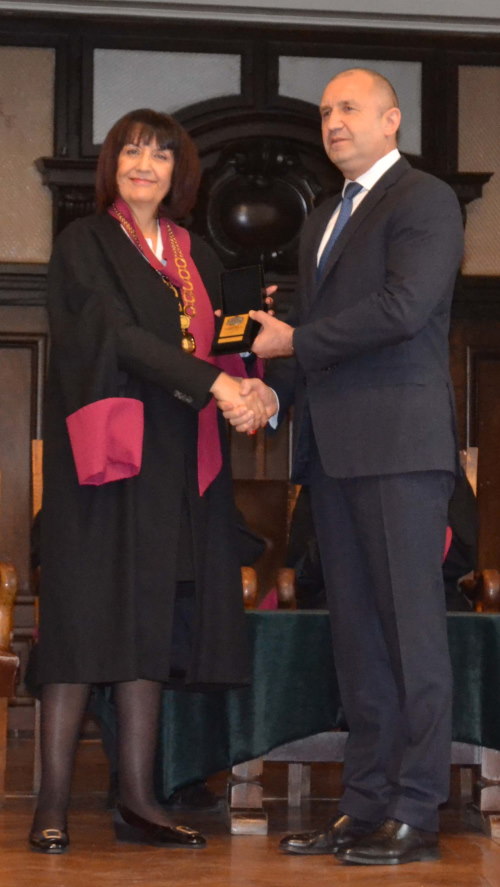
"Our society is sick. All its vital societal areas are sick. Journalism is also sick. That is why I express my immense gratitude to my fellow lecturers at the faculty for their unwavering desire to pass on experience, wisdom and knowledge to the younger generations, on whom we are counting on to restore the dignity of Bulgarian journalism and turn it into a real corrective, into a fourth estate, as is its vocation," the vice-rector said. He addressed the graduates and urged them to remember the glittering pages of Bulgarian journalism and Bulgarian journalism. "The examples are important because they show what the role of this profession is and we will steadfastly defend to the end the idea that journalism is the sphere that should facilitate dialogue in society, to illuminate its problems without inclining to yellow sensations, to gossip," said Assoc. Valchev. Finally, he wished everyone good health and much strength to follow their path steadfastly.
Minister of Education and Science prof. Prof. Sasho Penov also sent greetings. He said that when the Journalism major was created at Sofia University 70 years ago - in a world still dominated by newspapers, radio and movie reviews, hardly anyone imagined the magnitude of change in the new technologies of information exchange that we are witnessing and the ways they have changed and continue to change our society. "But in this area, education and science have largely empathized with the revolutionary change and even been its engine. This explains the dynamic and rapid development of journalism as well as other newer specialties," said Minister Penov, adding that in addition to the change in technology, journalism education has evolved and continues to evolve in a very dynamic social environment.
In his speech, the Minister of Education stressed that during all these years several generations of leading Bulgarian journalists have emerged from the university bench of the specialty with a huge impact on the culture and outlook of the Bulgarian citizens and with a huge contribution to the development of civil society in the country.
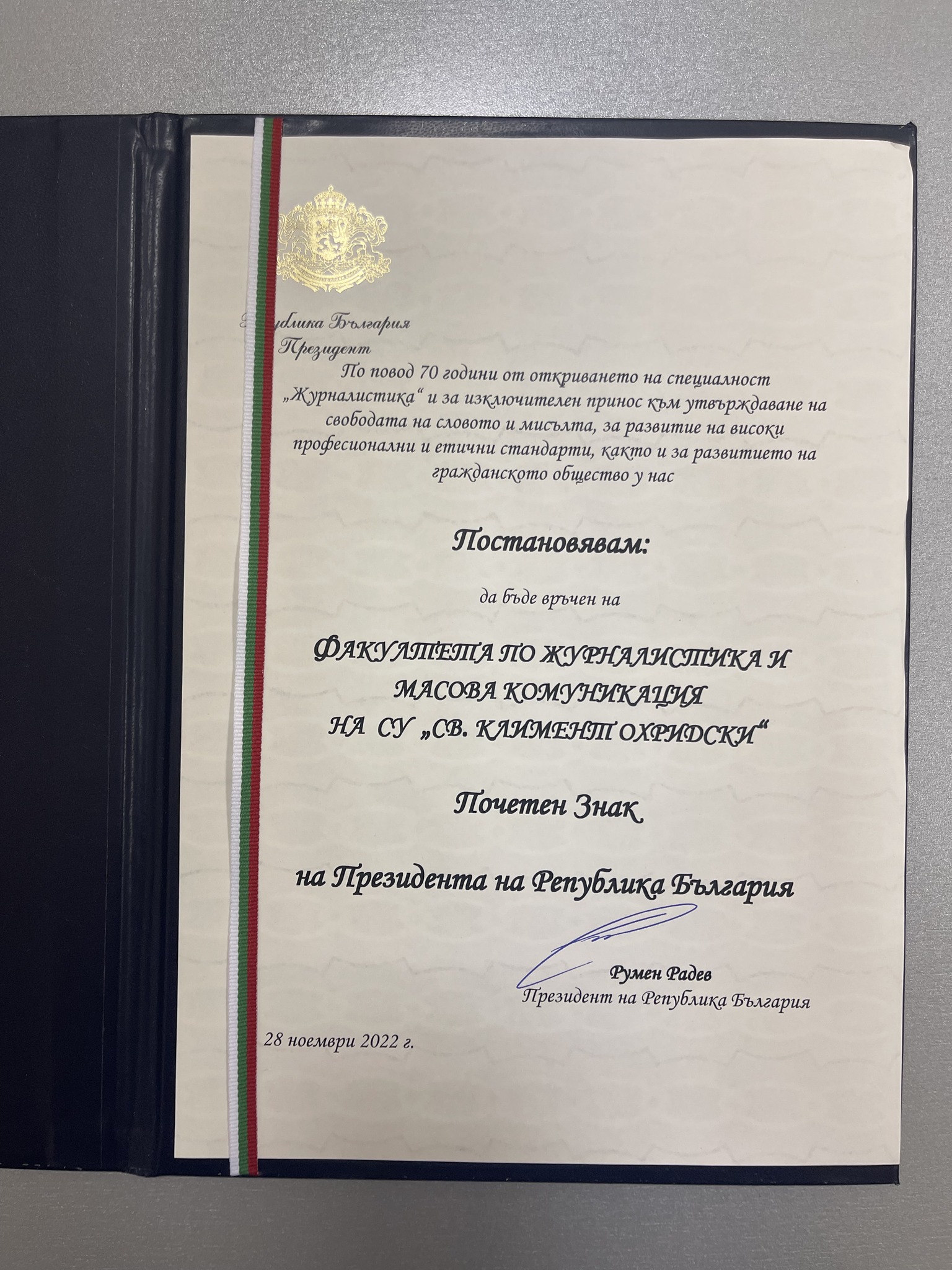
"The teachers of the faculty have written some of the most outstanding books of Bulgarian scientific thought and this contributes to the authority of the faculty at our university and its international prestige," said Prof. Penov.
Finally, he recalled the recently celebrated Day of the Awakeners and addressed the students, saying that the Faculty of Journalism and Mass Communication has educated awakeners and that they themselves are the future awakeners of the Bulgarian people. "Bulgaria needs journalists and media that not only inform but also educate and mobilize active citizens for social action and for our development as a truly just, social, legal and European country, where we all wish and dream to live," Prof. K. K. said. He added that in order to achieve this, we need people with an objective and critical point of view on what is happening in our country and in the world, people who have the attitude to objectively form public opinion with the clear awareness that public communication, public debate and communication between all of us should continuously lead us to development and to a better future for our community. "I trust that you are the young people who will strive to achieve this and I wish you well," the Minister of Education and Science concluded.

In his address, President Rumen Radev pointed out that success and recognition follow those journalists who subordinate their work not only to the highest professional standards and ethical norms, but also who manage to turn the words "courage, conscience and dedication" into a conscious daily practice and stand against the path of lies without succumbing to political and economic pressure.
He also noted that even in the Renaissance years, Bulgarian publications were the first institutions before the resurrection of the state, and publicists were expressors of the national ideal. "Since those Renaissance times, the media have undergone a number of political, economic and technological transformations. However, the fact remains that no era is comfortable for journalists dedicated to the truth, and the authorities always seek to limit their voice," Rumen Radev noted. He stressed the need for the role of journalists in defending the public interest and in counterbalancing apathy and lies.
According to the President, the restoration of statehood, people power and justice is unthinkable without free media and independent journalism. He said information is the engine of progress, but it can also have a destructive power far greater than that of missiles and bombs. President Rumen Radev stressed that the journalist's responsibility to the audience and to objectivity becomes even greater at a time when the boundaries between facts and their interpretation are increasingly blurred, when the truth fades in the clash of ideologies, and information - whether boiled or not - spreads at the speed of a click.
He said with an abundance of information and the explosive growth and rise of social media and the blurring of standards, our society increasingly needs a benchmark for professionalism and a steady anchor for truth, which is what public media is supposed to be. The President also noted that the priority of any government must be to guarantee freedom of expression through pluralism, clear regulatory mechanisms, transparency of media ownership and advertising, and most of all, by making public media financially independent of government.
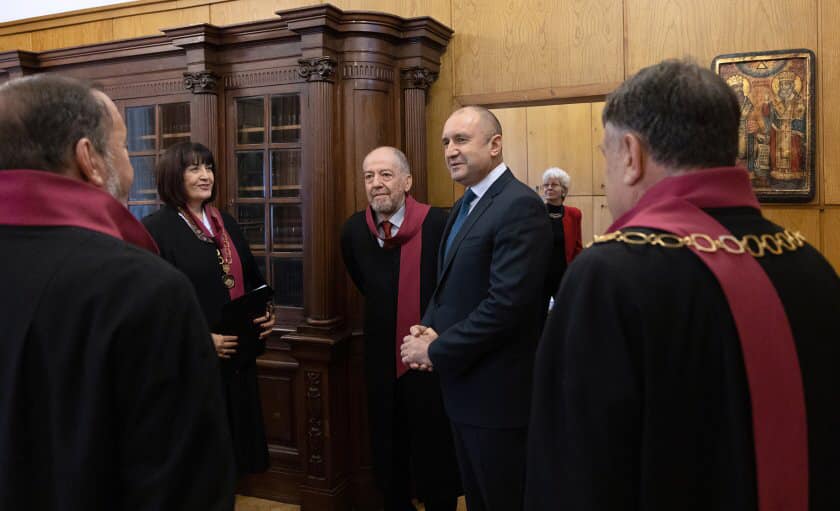
According to Rumen Radev, the future of Bulgaria as a modern and prosperous European country will largely depend on today's students and future journalists. He pointed out that they face the difficult task of strengthening the dignity of the profession and restoring its credibility.
President Rumen Radev urged the young people not to forget that freedom of speech begins with the personal freedom, dignity and conscience of the journalist and expressed gratitude to the management and lecturers of the Faculty of Journalism and Mass Communication for managing to preserve and build on the rich traditions of the faculty with the most modern forms and methods of education: "You transmit to your graduates principles to guide them in their professional path, provoke critical thinking and sensitivity to the problems of our society".
President Rumen Radev presented the Honorary Sign of the Head of State to the Dean of the Faculty of Journalism and Mass Communication, Prof.. Prof. Vesselina Valkanova on the occasion of the 70th anniversary of the specialty "Journalism" and for her outstanding contribution to the promotion of freedom of speech and thought. The honorary award is also for the contribution of FJMC to the development of high professional and ethical standards, as well as to the development of civil society in the country.
The festive day continued with the awarding of the long-time lecturer, scholar and researcher of the Faculty of Journalism and Mass Communication Prof. Dr. Milko Petrov with the Honorary Sign of Sofia University with a blue ribbon.
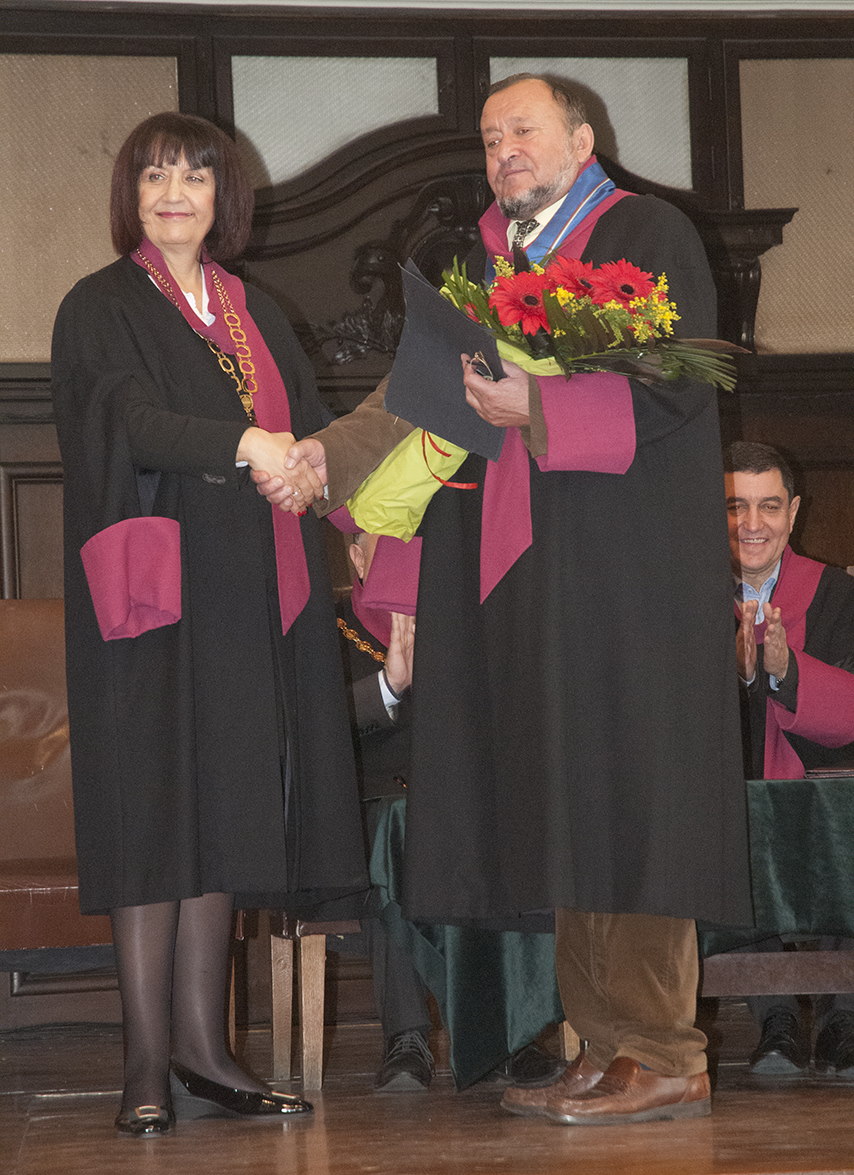
Prof. Petrov received the award for excellence in teaching and research and for his contribution to the development of university education in journalism and public relations in Bulgaria. Prof. Milko Petrov is one of the most prestigious and respected members of the academic community of Sofia University and the Faculty of Journalism and Mass Communication. For more than four decades he has been contributing to the development of Bulgarian science, education and culture as a lecturer, researcher, publicist, as a member of the Academic Council (two terms), Deputy Dean of the Faculty of Journalism and Mass Communication, Chairman of the Scientific Council, Head of three of the Departments of the Faculty. In addition to his numerous contributions to research in the field of journalism and public relations, as a leader and participant in large-scale research projects, he contributed to the development of science and education in the field of mass communication as one of the founders of the first university degree in public relations in Bulgaria, as the founder and chairman of the International Editorial Board of the prestigious journal "Media of the 21st Century". Proof of the high scientific and public authority of prof. Petrov's high scientific and scholarly standing is also demonstrated by his election as Chairman or member of the Boards of the representative professional organizations in Bulgaria in the fields of journalism and public relations, as well as of a number of international organizations.
Prof. Petrov has also been a member of a number of international organizations. Prof. Milko Petrov received the high award from the Vice-Rector of Sofia University Assoc. Prof. Dr. Georgi Valchev. Prof. Petrov also received the honorary degree of Prof. Prof. Dr. Jerzy Petrov. Petrov delivered a speech on the topic "Journalism - from the social cause to the algorithms".
During the academic celebration 105 Bachelors and Masters students from the Class of 2022 of the Faculty of Journalism and Mass Communication received their diplomas of higher education. 39 graduates graduated with excellent grades, four received diplomas and one was awarded a gold badge.
The Dean of the Faculty extended a special greeting to them, congratulating them on their graduation and wishing them successful realization, satisfying careers and happy lives. "Always strive for knowledge, strive to know, dare to know and act upon the knowledge gained! Love your professions and pursuits, it will help you to keep learning and expanding knowledge," urged Prof. Prof. Valkanova. She noted that this year the first graduating class of the Communication Management major graduated.
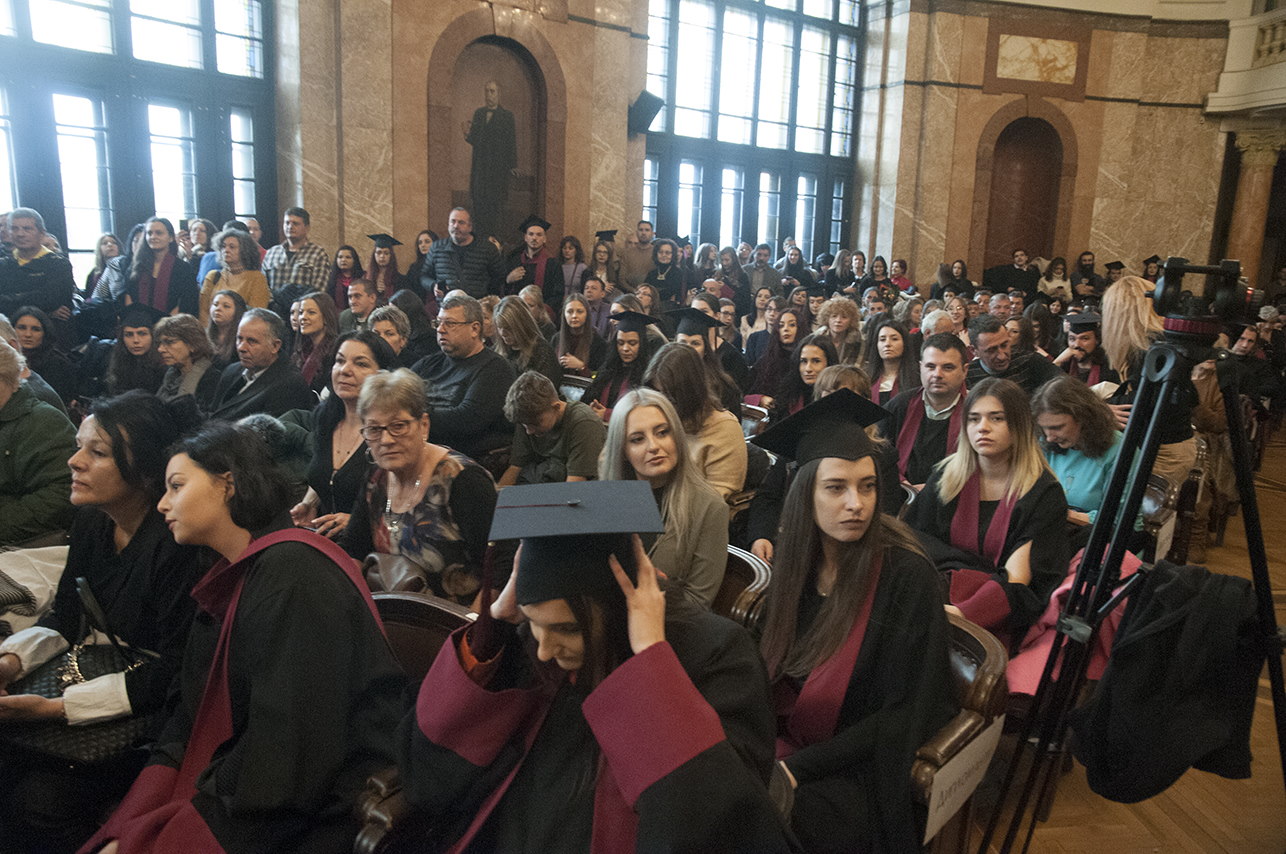
"You have a lot to give - go for it! You will accomplish much along the way and by realizing your goals. I know that you have all the qualities to be the personalities that move the world!" said Prof. Prof. Valkanova to her youngest colleagues and urged them as journalists, communication specialists, advertisers, publishers to remember that today they are leaving not any university, but Sofia University and that you will not stop representing our university, faculty, department, community of colleagues and supporters. Professor. Valkanova expressed her hope that knowledge will guide them, that the soundness of their ideas will distinguish them from opinions, even from correct opinions.

"In today's world, there is a real war being fought over facts and truth, and the most important lesson is the lesson of responsibility, of fighting on the front lines every day for the truth, for the public's right to know the truth. This divided, complex world needs stories and storytellers, it needs accurate and responsible information, it needs people to focus attention on that information. Today, you are those people," the Dean of the Faculty of Journalism and Mass Communication further stressed. "Welcome as our colleagues. Welcome to the next stage of your life! I wish you a successful beginning! Good luck!" said prof. Valkanova.
The graduates were congratulated by the Vice Rector of Alma Mater Assoc. Prof. Georgi Valchev, who told them that although they receive their diplomas today, they still have a lot of reading and development ahead of them. "If we as lecturers have managed to instil in you that personal development continues throughout life, we have done our job," said Assoc. Prof. Valchev. He drew attention to language, to speech, to words with meaning and urged his youngest colleagues, if they want to have a successful career, not to believe all the information that comes out on their phones. He urged them to open their senses, to filter everything through them before they create what they want to send as a message to the public. When they open their senses, they will begin to continually develop their minds. Finally, he urged them not to spare their hearts as they follow their professional path. The Vice-Chancellor stressed that it is a recurring theme today that success must necessarily come quickly and with it, high rewards. "However, true professionalism comes with time. Only hard work can make you truly professional," said Assoc. Prof. Valchev. Finally, addressing the graduates, he said that Sofia University and its doors will always be open to them, because from today on they are an integral part of its large college.
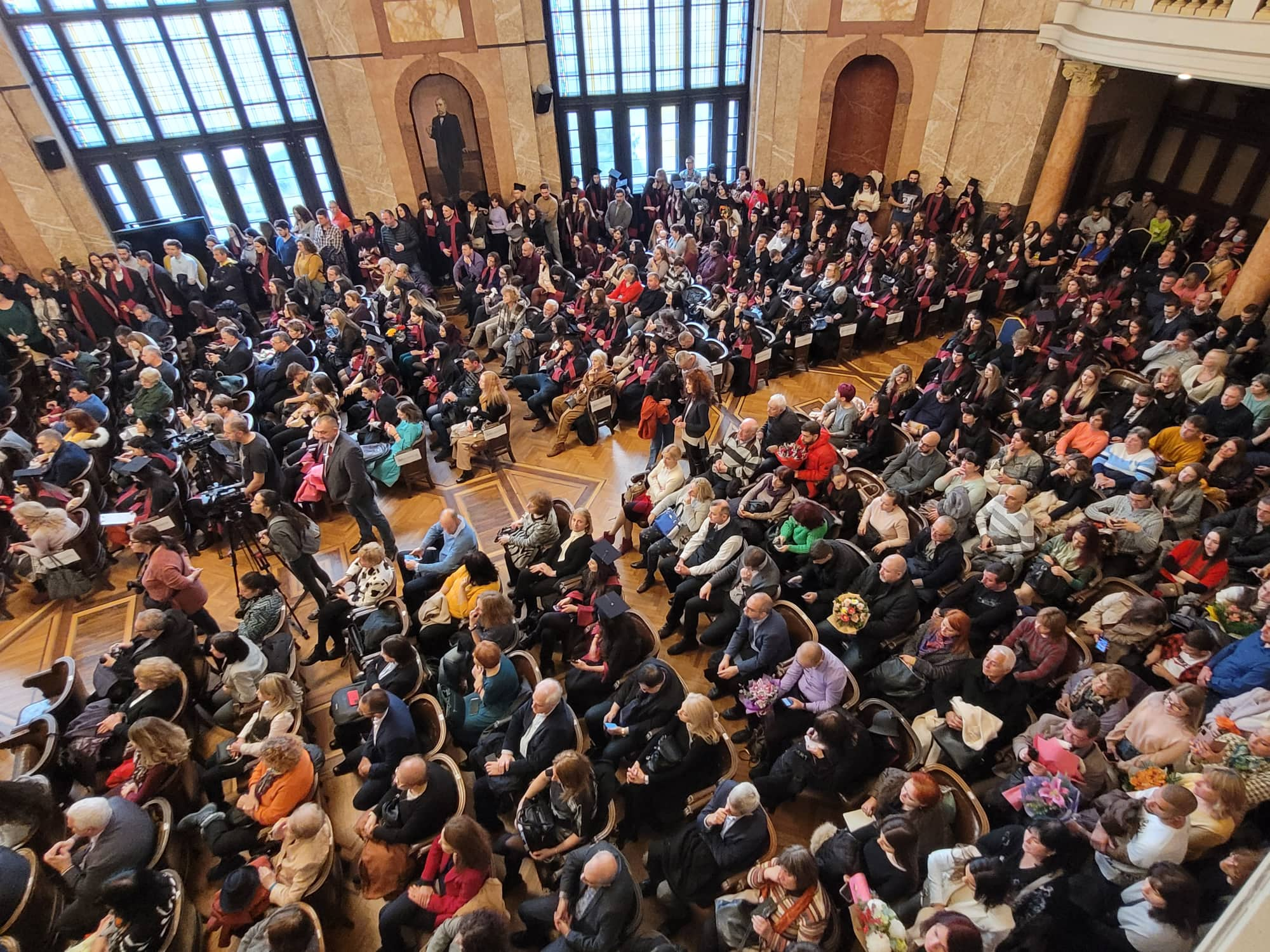
On behalf of the graduating students, Iva Rizova, the excellent student of the Class of 2022 of the Faculty of Journalism and Mass Communication, presented a greeting. She recalled the first days and the first lecture when they believed that once they graduated from school, they were already very big. "It turned out that we are not and that we still have a lot to learn," Iva Rizova said, adding that this class is unusual because they spent part of their studies not in classrooms, but in virtual rooms - a challenge for them and their professors. She stressed that despite this, their common passion for journalism has brought them together, new friendships have been forged and together they have learned valuable lessons. "We all understood that the famous five questions are not only fundamental for journalism, but for every situation in life," she stressed, congratulating her colleagues on their graduation and wishing them a fair wind and a successful career.
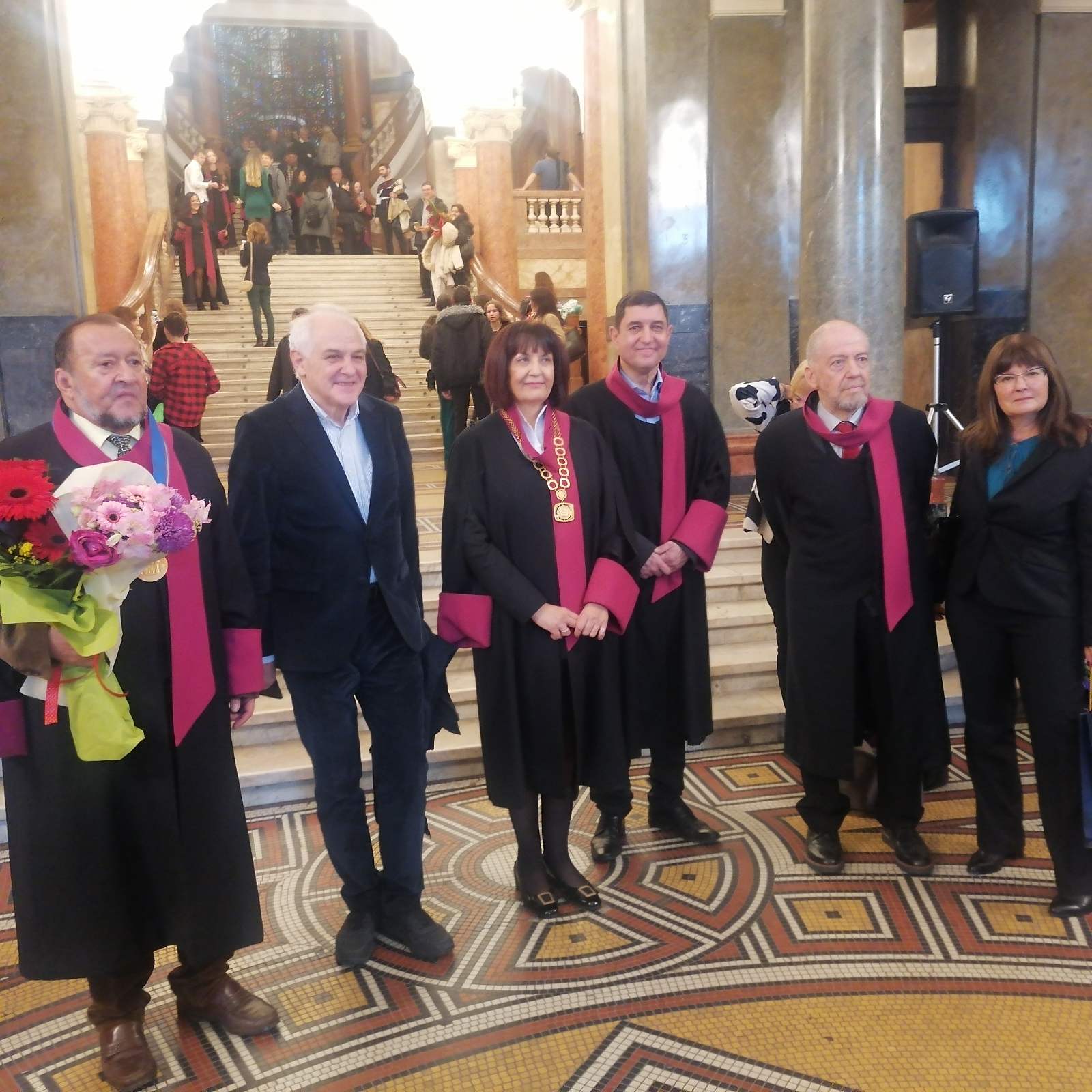
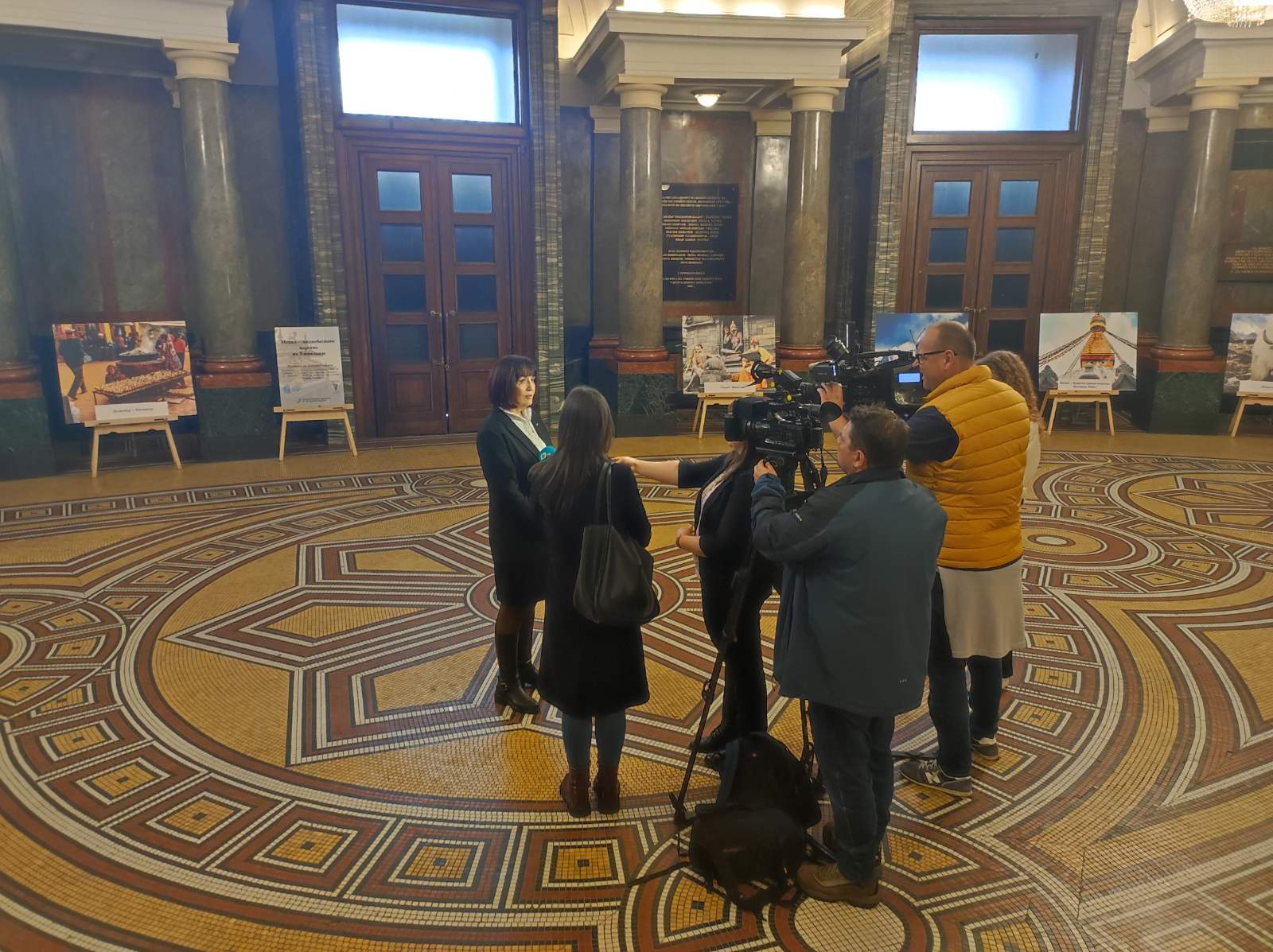
Photos by Adriana Tangacheva, Antoan Bozhinov, Vanya Stoyanova, Simeon Vassilev
